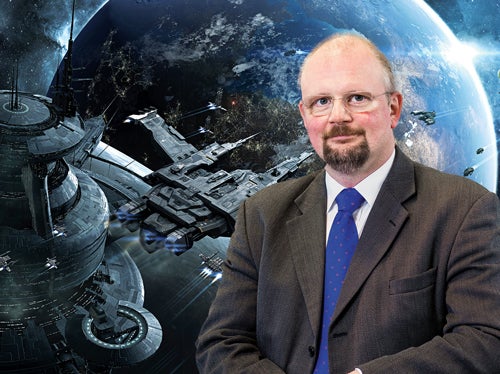The Virtual Economist

Insights from the wild career of one of Iceland’s foremost scholars
By Pippa Jack
Eyjolfur Gudmundsson became the first Ph.D. holder ever hired to monitor the economy of a massive multiplayer online game.
He has moved from the ivory towers of academia to the fishing boats of Galilee to the starships of fantasy gameplay—and back—but when you talk to Eyjolfur Gudmundsson, Ph.D. ’02, his sensibilities are firmly rooted on earth.
Gudmundsson—under Icelandic naming convention, he goes by Eyjo, or Dr. EyjoG, for short—is famous, in certain circles, for being the world’s first virtual economist, managing the millions of dollars that flow annually through the online fantasy world of Eve Online.
Last year, he left Eve’s 8,000 star systems to become president of the University of Akureyri in Iceland. At 46, he’s remarkably young to lead a university, but he’s propelled by his urgent conviction that universities must do a better job preparing students for the job markets that will exist in ten, twenty, and thirty years.
But let’s back up. Eyjo grew up in Iceland, and followed his interest in economics to a post-grad research job there. Then, in what he says is a life-long pattern—”I seem to fall into things”—a planned move to Norway took a last-minute swerve to URI, thanks to ties between the research-economics professors he admired, and his abiding interest in fisheries economics.

To Bitcoin Or Not to Bitcoin
The virtual currency is internationally accepted and getting larger and larger. Dr. EyjoG says it can be a useful tool, but proceed with caution:
The GoodIt’s not governed by any country. That removes the temptation to print money when the country is in financial trouble or for other political reasons.
The BadThat lack of real-world backing allows bitcoin’s value to fluctuate wildly, making it a risky investment.
The UglyWhat is behind it, asks Eyjo, other than some fancy coding? And all code, he points out, will eventually be broken.
He found kindred souls here, where the fishing boats that run out of Galilee and New Bedford struggle with the same issues as their counterparts to the far north. In fact, fishing is so tied up with Iceland’s history and financial stability—it represents about a third of the country’s exports—that he says best-practices discussion is practically a national pastime there. His doctorate at URI was devoted to market information and fisheries management, with links to a sustainable seafood labeling system. The idea—that consumers would pay a premium for responsibly harvested seafood—is now recognized as a success.
But staying in the U.S. wasn’t an option—he’d made a deal with his physical therapist wife that the family would go home after five years. So he took an assistant professorship at Akureyri, a small school in the rural northeast of Iceland, where half the student body learns remotely through online-only classes. Within a few years he was a dean. “I thought I was set for life on academics,” he recalls.
But “this strange little company” came calling, and its pull proved irresistible. Dr. EyjoG first encountered the founders of CCP games at an experimental economics seminar attended by URI faculty as well as Nobel laureate Vernon Smith; they passionately urged the gathered academics to help the company manage its virtual currency, saying it would be a perfect arena for serious economic study. “As I was listening,” Eyjo recalls, “I thought, they’ve got it right—it would mimic a real economy.”
A year later, 150,000 people were playing CCP’s Eve Online, and they advertised for an economist. Eyjo applied, and in 2007 became the first Ph.D. holder ever hired to monitor the economy of a massive multiplayer online game (MMO for short).
During his tenure, Eve attracted millions of players, with up to 65,000 people from all around the globe interacting within it at any one moment. Like other MMOs, it quickly became a target for “gold farmers”—people seeking to siphon money out of the game, usually by selling virtual goods for real money. Eyjo’s mandate was to allow the escapist play to flourish without permitting Eve to violate international tax codes or money laundering restrictions.
Eyjo’s solutions, including a popular move that allowed players to buy game time for others, helped stop the cash leaking from Western living rooms to Chinese cybercafes. Or at least, mostly. “There will always be some people with more time than money, and the reverse,” he reflects. “If there is demand, there’s no stopping it; you just fight to keep it to a minimum.”
Meanwhile Iceland’s hard-hit economy was emerging from the global meltdown, and Dr. EyjoG felt an itch to apply some of the lessons he’d learned at Eve to the world of higher ed. So when Akureyri advertised for a new president in 2014, he once more found himself jumping industries.
His year at the helm has proved challenging. “It’s a public university, so we don’t charge tuition,” he explains, “and we’re working within a very tight budget. We educate people all over the island, trying to keep our small-community feel, while providing the education needed to succeed on a national and global level.”
He has a vision, forged in the crucible of Eve: a global techno-economy, he insists, is right around the corner.
“What it taught me is that it doesn’t matter where you live in the world, as long as you have the right education,” he says. “You can do whatever you want, where you want, because the Internet will keep you connected to your market.”
He describes a librarian who, 15 years ago, built a website about paper dolls. “It turns out a lot of people are interested in this,” he says, “and when Google advertising started, her site took off. Now, she’s living in a remote area of Iceland, with something close to $1.5 million a year in revenue.”
Another lesson: the line between virtual and real worlds is ever more blurred. For instance, Dr. EyjoG believes we are only a few years away from widely available software that will translate on the fly. As technology becomes an ever more intimate part of our lives, online relationships between different-language speakers may become as immediate and vital as face-to-face meetings. The trick, he says, will be learning how to navigate all these different communities. Just as an individual once moved between the overlapping social spheres of family, school and work, people now add the worlds of social media, videoconferencing, and shared work, financial and entertainment platforms.
Perhaps it will be impossible for anyone reading this now to be truly successful in this new world, he suggests: “The generation that is coming after us may be the first to do this successfully, creating powerful online communities that will be more capable of adapting to the rapid change we face.”
But then again, he points out, it’s hard to know how old anyone is on the Internet. “If you are elderly but can be online as a 20 year old, then are you old or are you young?”
Perhaps it makes more sense to ask: Is there opportunity outside your physical door, or should you go online to seek it? After all, he says, “Here I am, sitting just under the Arctic Circle, speculating about all this. Sometimes it’s our very isolation that forces us to innovate.” •
 Home
Home Browse
Browse Close
Close Events
Events Maps
Maps Email
Email Brightspace
Brightspace eCampus
eCampus


